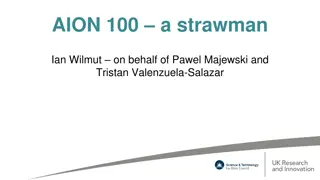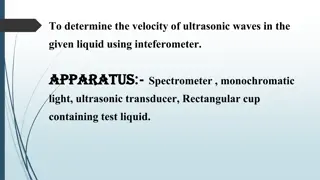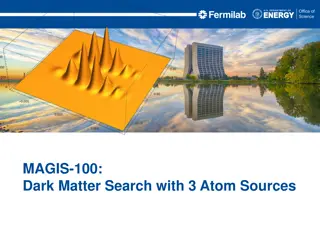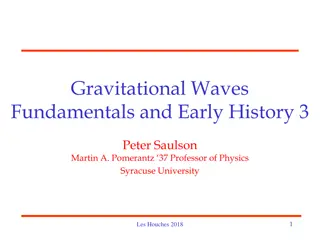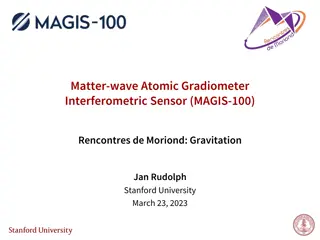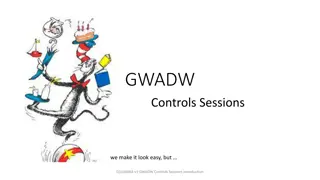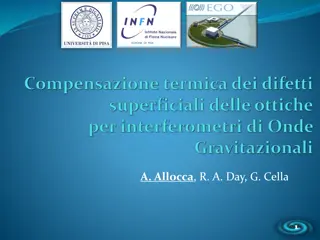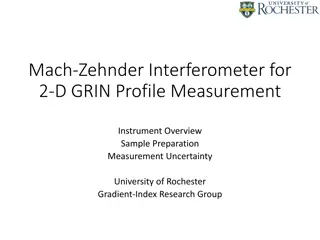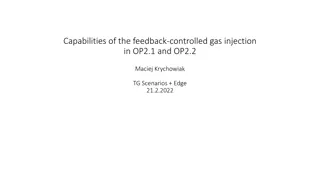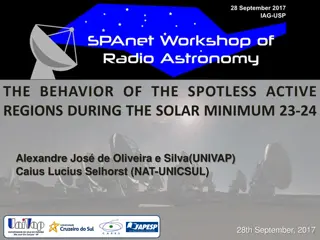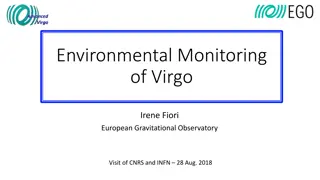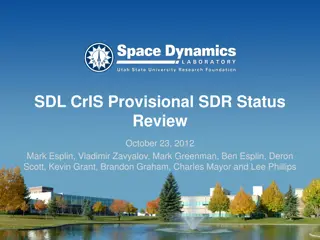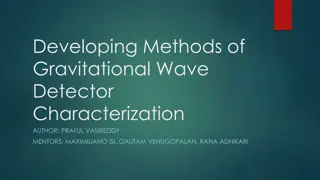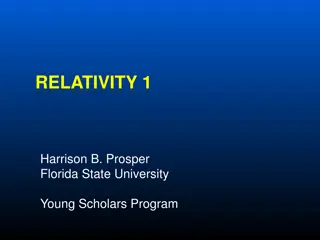AION 100 – a strawman
The AION100 project presents a need for a 100m interferometer with a strawman proposal outlined by Ian Wilmut on behalf of Pawel Majewski and Tristan Valenzuela-Salazar. Starting assumptions include building in small modules, crane access, and progressive testing during assembly. Detailed shaft cros
1 views • 14 slides
Determining Ultrasonic Wave Velocity in Liquid Using Interferometer
An ultrasonic interferometer apparatus is used to determine the velocity of ultrasonic waves in a liquid medium by creating longitudinal stationary waves and utilizing the principles of diffraction. The experiment involves passing monochromatic light through the liquid, creating an acoustic grating,
0 views • 16 slides
Cutting-Edge Dark Matter Search with MAGIS-100 Gradiometers
Cutting-edge dark matter search using the MAGIS-100 instrument with three atom sources is discussed in detail. The configurations, interferometer phases, and data analysis techniques are explored to maximize the efficiency of detecting dark matter signals. The study also delves into exploiting corre
1 views • 10 slides
Understanding Gravitational Waves: Basics and Detection Challenges
Exploring gravitational waves fundamentals, early history, and challenges in detection. Covers topics like interpreting noise power spectrum, shot noise in interferometers, radiation pressure, and quantum limits. Illustrates the importance of noise spectrum analysis and mathematical operations in un
0 views • 42 slides
Cutting-Edge Developments in Gravitational Wave Detection at MAGIS-100
Discover the groundbreaking MAGIS-100 Matter-Wave Atomic Gradiometer Interferometric Sensor, a 100-meter baseline atom interferometer under construction at Fermilab. Explore the mid-band science potential, sky localization precision, and long-baseline AI applications for gravitational wave detection
0 views • 15 slides
Optical Frequency Interferometer Bench Analysis
Detailed examination of the optical setup for an Optical Frequency Interferometer (OFI) system, including the input/output configurations with various optical components such as prisms, crystals, and wave plates. The analysis focuses on the path and behavior of beams within the system, considering r
0 views • 14 slides
Advanced Topics in Control System Design and Implementation
Delve into the complexities of control system design, from system identification to modern control techniques. Explore the challenges of designing controls for systems like interferometers and discuss the integration of classical and modern control theories. This workshop offers insights on optimal
0 views • 19 slides
Detecting Gravitational Waves with Interferometers
Gravitational waves, predicted by Einstein's Theory of General Relativity, are incredibly weak ripples in spacetime that can be detected using interferometers. This method involves using suspended mirrors to reproduce free-fall conditions, enhancing signals through various techniques like Michelson
0 views • 23 slides
Mach-Zehnder Interferometer for 2-D GRIN Profile Measurement
Mach-Zehnder Interferometer is a powerful tool used by the University of Rochester Gradient-Index Research Group for measuring 2-D Gradient-Index (GRIN) profiles. This instrument covers a wavelength range of 0.355 to 12 µm with high measurement accuracy. The sample preparation involves thin, parall
0 views • 6 slides
Updates on iKAGRA Installation and Configuration Changes
The report discusses changes in the iKAGRA configuration from Fabry-Perot Michelson Interferometer to Michelson Interferometer due to schedule constraints and budget limitations. The document outlines the revised schedule for installation tasks, shift applications, and the impact on the KAGRA projec
0 views • 16 slides
Capabilities of Feedback-Controlled Gas Injection in OP2 Scenarios
Divertor and main gas injection systems in OP2 have sophisticated feedback controllers ensuring precise gas flow control. Diagnostic signals availability includes interferometer data, CoDa station information, bolometer readings, and more for OP2.1 and OP2.2. Various sensors and instruments are in p
0 views • 4 slides
The Behavior of Spotless Active Regions During Solar Minimum
In this work presented at the SPAnet Workshop on Radio Astronomy in 2017, the study analyzed the physical parameters of spotless active regions observed during the solar minimum period from 2007 to 2010. Radio maps at 17 GHz from the Nobeyama Radioheliograph and magnetograms from the Michelson Doppl
0 views • 14 slides
Environmental Monitoring of Virgo Irene Fiori European Gravitational Observatory Visit
The environmental monitoring of Virgo at the European Gravitational Observatory involves studying various environmental influences on the interferometer, such as electromagnetic fields, radio waves, ground motion, and mechanical vibrations. Sensors are strategically placed in experimental halls to d
0 views • 12 slides
Satellite Data Review and Calibration Analysis
Review of the SDL.CrIS provisional SDR status, completion of various CrIS cal/val tasks, and detailed assessments of different bit-trim masks for satellite interferometer optimization, with findings on bit-trim errors, interference analysis, and mask adjustments.
0 views • 44 slides
Methods of Gravitational Wave Detector Characterization
Developing methods for gravitational wave detector characterization is crucial for understanding noise sources, distinguishing noise from signals, and improving detection range. Benefits of small-scale prototypes include easier testing and control of interferometer features. Techniques such as ALS (
0 views • 18 slides
Exploring the Quest for Aether: A Journey through Relativity and Failure
Delve into the intriguing topics of special relativity, James Clerk Maxwell's equations, the concept of aether, and the groundbreaking Michelson-Morley Experiment. Witness the evolution of scientific understanding and the ultimate failure of the stationary aether hypothesis.
0 views • 32 slides
